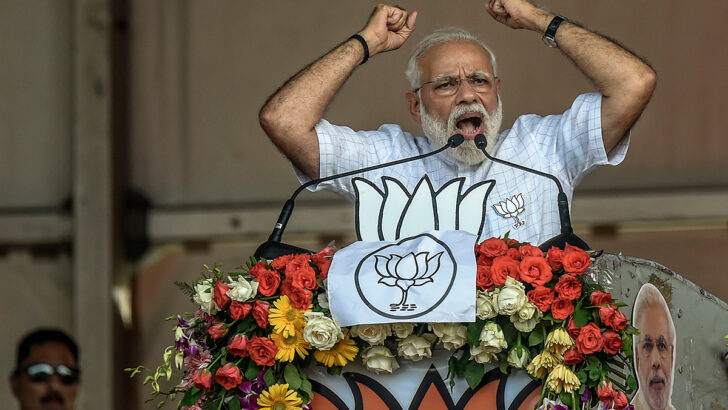As I write this the Republic of India, the world’s largest democracy, is voting in a general election of a most complicated kind, with polling across the states in an extended series of ballots.
This is the largest election in the world. By the time this article appears in print, unless something cataclysmic happens, and despite the resurgence of the opposition parties, the BJP, the Hindu nationalist party that is led by Prime Minister Narendra Modi, will have been returned to power for a third term.
There are some 970 million people eligible to vote, some 257 million of these are in the northern state of Uttar Pradesh where Modi has his constituency, and which has long been seen as crucial to gaining power in Delhi.
This election is a matter that greatly affects us here in Ireland given our long historic links with the subcontinent going back, the presence of so many Indian nationals living here, and perhaps even more importantly, studying here at our universities.
Engaged
Ireland is deeply engaged with India, and what happens there affects us. Not least is the position of Christians among the minorities of India, which many here feel deep concern out of sympathy for fellow Christians suffering in often difficult circumstances.
To understand the problems of these minorities we have to try and understand Hinduism. This is not just a matter of charming customs like Diwali, or wearing a sacred red thread which Rishi Sunak celebrates; but having to deal with the interpretation of Hinduism and mythical Indian history that drives the anti-minority outlook of the BJP.
Professor Doniger’s book, running to nearly 800 pages, will provide those who are especially interested with a key to the background to the present situation in India, where they can launch space probes and still have soaring rates of unemployment and poverty.
Banning a book which provides an alternative academic view of Hindu myths, history and culture, which is disfavored by the BJP, was disturbing”
Keep in mind that legal action was taken against Penguin India, the original publishers, who withdrew the book under government pressure. The rights were passed to Oxford University Press, who sold it widely around the world.
Banning a book which provides an alternative academic view of Hindu myths, history and culture, which is disfavored by the BJP, was disturbing. It has been said in fact, that Hindus, have in effect no sense of history, but live in a world combining ancient gods with state of the art computers.
For other readers though, a knowledge of her point of view will illustrate the complexities of an unfamiliar polytheistic outlook, which often seems so contradictory of its views.
Many, who feel less need for a scholarly encounter with ancient India, may find Prof. Doniger’s introduction to her selection of Hindus Myths (Penguins Classics, £10.99 / €12.27) will give them as much as they need in most cases.
These contradictions of Indian life go to the heart of Hindu rule. Prime Minister Modi began his public career as a teenager in the paramilitary Rashtriya Swayamsevak Sangh (known as the RSS), founded a century ago.
Nationalism
The RSS leadership steered Modi into the BJY as an interest to motivate it to a deeper nationalism. The RSS played no part in achieving Indian independence. It was set on a higher national destiny.
Prof. Doniger quotes in her afterword a passage from, M. S. Golwalkar, the then leader of the RSS, writing in 1938:
“The non-Hindi peoples of Hindustan must not only give up their attitude of intolerance and ingratitude towards this land…but must..stay in the country wholly subordinated to the Hindu Nation, claiming nothing, desiring no privileges, far less any preferential treatment – not even citizens rights.” (M. S. Golwalkar, We: Our Nation Defined, Nagpur, 1936, pp, 48-49.)
The first cabinet was formed in the spirit of the constitution with members of all the important communities in India, including Christians”
This was not the way the Republic of India was meant to be. Paul Thomas, in his authoritative history of Christians and Christianity in India, first issued back in 1954, notes that the new Indian constitution guaranteed equality of treatment to all castes and creeds, freedom of worship, and the right to propagate religious ideas by peaceful methods.
The first cabinet was formed in the spirit of the constitution with members of all the important communities in India, including Christians.
However, Thomas ended his important book (now newly available in the shops) on a more cautionary note:
“All this augurs well for the future, and as long as the present leadership lasts Christians as a community have little to fear. But whether the same liberal traditions will be followed after the passing away of the present generation, the future alone will show.”
Battles
Today inter communal battles persist across India. The BJP seems to have little interest in assuaging these conflicts. BJP believes in what might almost be a grim adaptation of a familiar Ulster catch phrase, “A Hindu state for a Hindu people”. No wonder that many of India’s minorities face the future with fear.
It antedates Islam, and has been a part of Indian culture along the south west coast for centuries, even influencing Hinduism”
Paul Thomas in his well researched, even-handed book, shows that Christianity in India does indeed go back to the Age of the Apostles, with the arrival of St Thomas to preach and die there before 72 AD. Thus it antedates Islam, and has been a part of Indian culture along the south west coast for centuries, even influencing Hinduism. But the story he tells covers much more than that, coming down to the emergence of the Church of South India in the last century as unions of the Reformed Christians traditions and the state of religion in independent India.


 Peter Costello
Peter Costello Nanendra Modi on the campaign trail.
Nanendra Modi on the campaign trail. 